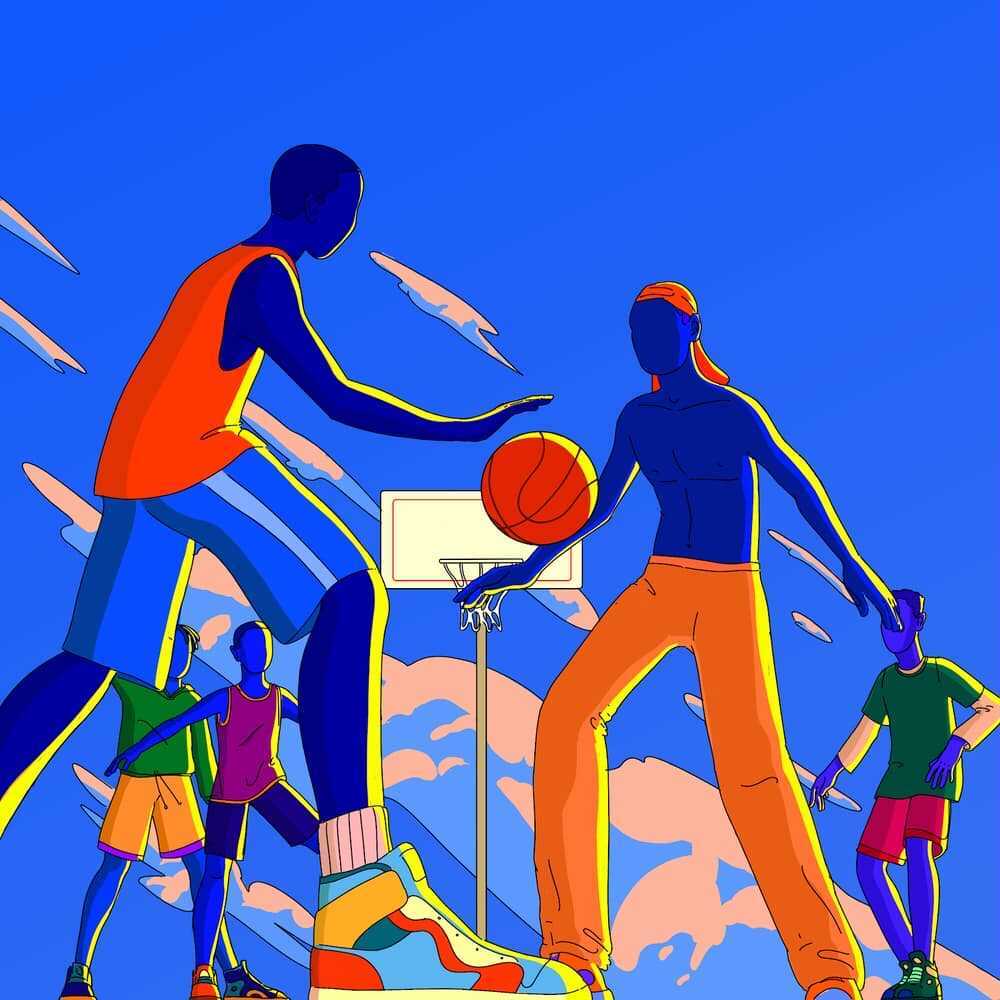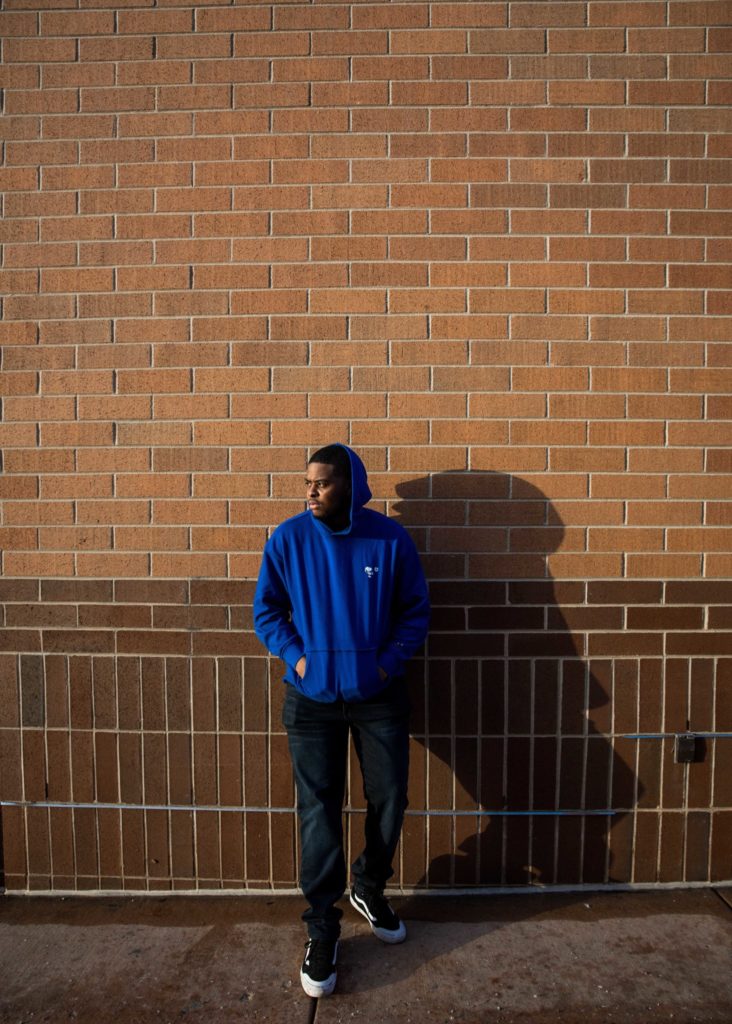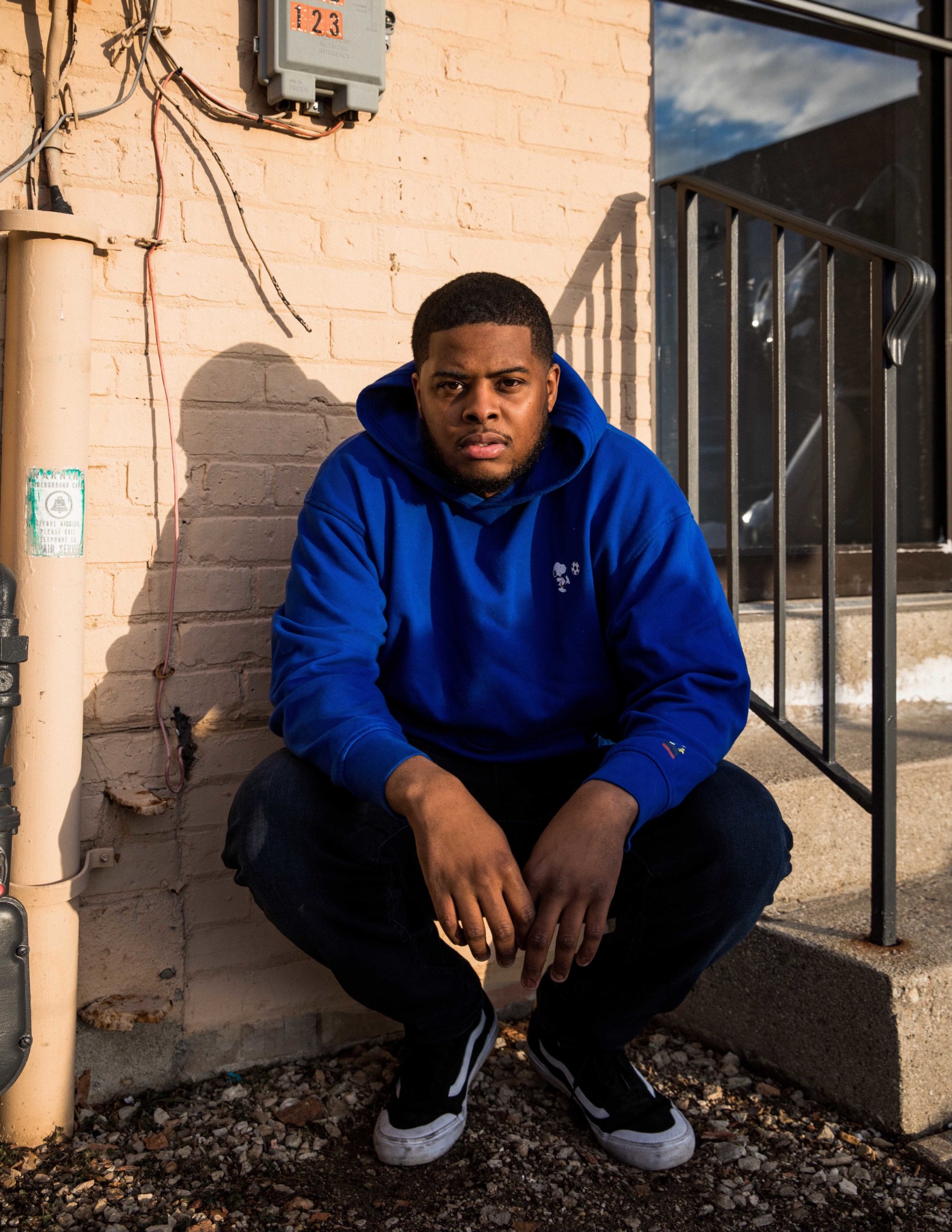In the opening scene of a short film released a few days after his debut studio album, The Color Blue, dropped, Chicago hip-hop artist D2x refers to himself as a “futurist.” Growing up on the South Side, he had dreams of becoming a pro basketball player, but altered course after realizing basketball might not work out. “I remember one time in class, I was like, ‘if basketball don’t work out, I’m gonna just be a rapper,” X said. “Once I got into music, I knew exactly what I wanted to do.”
Basketball dominated X’s life growing up. During the summers, he played Amateur Athletic Union (AAU) travel basketball. In high school, he played at St. Rita of Cascia at 79th & Western, where he garnered Division 1 interest, was nominated to play in the McDonald’s High School All American game, and was named to the Catholic League all-conference team during his senior year.
In 2016, when it came time to make a decision about playing in college, he said he didn’t have too many options. After briefly attending Western Illinois University as a walk-on, he decided to come back to Chicago to pursue music full time.
Nearly five years later, the Windy City wordsmith has made his mark. Released on March 26, The Color Blue is a thirteen-track, thirty-eight-minute coming-of-age story that sheds light on how the twenty-three-year old found purpose through his music.
“I changed dreams, as far as I’ma take it/No matter where I’m grindin’, on my way to be the greatest,” he raps on the first verse of “Time,” where he explores where his head was at when he decided to stop pursuing his basketball dream.
Lyrically, The Color Blue sees X assuming an everyman persona—he is that one character in the cast that everyone is rooting for. His brightest lyrical highlights are his most human of moments, such as the track, “Day Job,” where he explores the hardships of working a menial job while chasing his dream.
While X waxes poetic throughout the album about the determination he has to make it in music, he always stops short of giving himself too much credit. He is quick to shout out his faith in God, his family, and his biggest supporters, without all of whom he insists this album would not exist. “They’re the backbone of my art,” he said.
Executive produced by GLOhan Beats and Ro Marsalis, the sounds on The Color Blue are steeped in soul, jazz, and blog-era hip-hop worship. The intro track, “Hues,” features a dusty big band horn section and some grumbling legato bass hits, while “Hoop Dreams” features a sunny chipmunk soul vocal sample. There is some live instrumentation too, with tracks such as “Blue Light Nights” and the album’s closer, “Picasso Blue/Thoughts From A Basquiat,” featuring some pretty soprano saxophone passages courtesy of Canadian producer and instrumentalist Zander Miller, also known as Millwood.
X recently talked with the Weekly about his life and work. An edited transcript follows.

What has the reception been like since The Color Blue dropped?
I feel like it’s steady growing. It’s my first project, so I’ve been learning within the process; I didn’t try to do too much as far as this being the introduction for me. I just stuck to a rollout that I felt was not too over the top, but that gave people enough insight to connect to the project. Before the release, I dropped the promo trailer, which was sort of like a Nike commercial. It was something different that I haven’t done. Typically, most people would have been dropping a music video; we wanted to do something different, so we incorporated the promo trailer and dropped the album a week later.
The next week, we put out a short film. I felt like I finally had a chance to execute the visual aspect of what I was aiming for, to tell the story of how I became a musician, and something that was a part of my entire life was the basketball theme aesthetic. I’m content with the fact that people know exactly what I was aiming for and the meaning behind it. Ever since then—it’s been like two months now—I feel like it’s continuously growing. More and more people are tuning in about it, and I haven’t let up on promoting it. I’m pretty pleased.
Why does blue feature so prominently on this album?
First and foremost, blue is my favorite color. But really, with the title and the meaning behind the album, it was more so a connection with my feelings and emotions. I was learning new things about every other month throughout the years, and the correlation I was able to build was that I started to look up the meaning about the color, and I saw that the color blue meant many things—it can mean rebirth. It’s a calming color; it can be connected to sadness. I read about spiritual realization and so many other things. When I saw that, I’m like, “Whoa, that’s crazy,” because this is the type of period I feel like I have in my life. I feel like I’m in a transitional period, for my art, the transition period with getting married or overcoming trials and tribulations that I deal with in my life each and every day. Really just the ups and downs [of] graduating college and going straight into adulthood, the responsibility that comes with being a man every day.
Playing along with the title, I also learned about my influences with art, paintings, and jazz music—how the color blue is one of the most essential colors in jazz. I learned how Pablo Picasso had a blue period back in the early 1900s. He had a series of paintings throughout numerous years, but he was just painting every painting like different hues and different strands of blue. It started from one of the toughest times of his life, where one of his best friends committed suicide; that was his first painting that he made within that period. Overall, the color blue was just to create different moods and different shades—how color schemes could convey different arrays of emotions.
Could you talk about your love of jazz?
If I was in another life where hip-hop didn’t exist, I would have tried to be a jazz musician. It’s just the way it makes you feel. I was learning more and more about jazz throughout the years, going back to Miles Davis’ Kind of Blue album or Blue Train by John Coltrane. Maiden Voyage by Herbie Hancock. From that point on, I continuously kept playing different albums, and I created a playlist for myself. I started to continuously add songs… soulful songs, jazz songs and stuff that could give me inspiration to create my albums, and it turned out pretty well.
The actual album title that I was sitting on at first, I had this title called Hoops. I was trying to do this basketball theme in a chronological order. But it felt like… it wasn’t forced, but it was too constructive, to the point where I felt like I was stressing myself out trying to stick to a conceptual idea that can really become its own conceptual idea when I just write about my life, so the color blue was the main thing that has driven it all, and jazz music was the number one thing.
What did you want to achieve with the sounds of this project?
Overall, just to make the best music I can make. To be honest, I wanted to create just a new catalog of music. Live shows are opening back up and I want to have something new to perform. I wanted a rebuilding and rebirth period, reconstructing a whole sound and turning it into something new, something that I want to build on. I always tell my wife, I’m in a period of my career where I feel like I have a new beginning with this album, especially being my first one. First albums [are] really what can define artists throughout years of their career and something that people will always go back to, no matter how successful I get in this game. So, I’m just thankful that this was the first one. I feel like I accomplished everything I wanted to musically — everything else is a bonus.
“Day Job” deals with the pressures of growing up and becoming a man. It seems like your faith in God helps you with navigating adulthood. Could you speak on that?
I feel like throughout the whole album, my faith helped me. It’s crazy because before [writing] every single song, I prayed. I tapped into my spirituality, and I tapped into something that I know that helps me be the best person I could be. For a while, I felt like I was shying away from the spirituality aspect of me. Also, just me learning and growing as a man, I feel like I’ve gotten to a point now where I’m not afraid to fully express myself and fully express how I am. That’s a part of me, it’s always been a part of me. I prayed before [writing] every song, and from that point on I was able to write everything I felt. That’s how everything came together.

What role has your family played in the success you have had?
They helped me stay grounded, and they helped give me a shift from music. I feel like family is the most important thing. In order to have any type of structure in your life, you need family, and I feel like they give me the completeness and wholeness [and] what I needed in my life to be the best person I could be. I feel like without family, none of this would have happened because every day I’m trying to think of new ideas that are all inspired by my life and the people that I care about. Without them, this album wouldn’t have been made, I wouldn’t even be where I’m at, I wouldn’t have grown as a person. So I feel like they’re the backbone of my art. They’re the backbone of me overall—spiritually, and physically, mentally.
There is a lot of blog-era hip-hop homage on this album. What does that era mean to you?
It means the world to me because that’s what I grew up on. Thinking back, I was playing basketball every day—at the park, AAU, summer travel basketball. These were the projects that was in my head when I was working out as a young adolescent, aspiring to be the best basketball player in the world. [J. Cole’s] Friday Night Lights was one of those projects. I still remember 2010 in my basement, I got my headphones on, I’m on a treadmill listening to “You Got It” by Wale and J. Cole, I’m just inspired. So that was one for me. The Warm Up as well, and The Come Up.
Also Mac Miller’s early projects. 1999 by Joey Bada$$, I love that one. It was so much cool rap that was around at that time; that’s the type of rap that I grew up on. I feel like that blog era of hip-hop overall was what’s driven me to kind of [be] like, “I could do this.” I’ve studied this type of music even before I thought about making it, and I wanted to bring that type of sound as a motivational aspect on my project so I could tap into everything that influenced me. I plan to continue that moving forward. I want to continue to grow, but I to keep that style in my music because I feel like the best comes out of me when I rap over things that I’ve been used to for so long.
“Adult Swim” has a lot of nostalgic references. Can you talk about the nostalgia in the lyrics, and how that played a role in the writing of this record?
I heard the beat on Instagram. Zander Miller, his production name is Millwood. I never rapped over a beat like that, but I want to challenge myself and let myself know like, “I feel like I could rap over anything.” So once I started writing to it, I started getting great vibes. Thinking about the trip I took to LA back in 2018, that inspired my Enjoy Life EP, my first ever. From that point on, I just started thinking about other things, thinking about things that made me happy.
Being a kid at home on a weekend, you don’t have school. Eating cereal in the morning, I used to always watch Cartoon Network [and] Disney Channel. So I wanted to bring up a few shows. Drake and Josh was one of my favorites. I also loved Ned’s Declassified [School Survival Guide], even Suite Life of Zack and Cody. There’s so many shows that inspired me, but even those few was able to just captivate on everything that was influencing me. I feel like nostalgia was something that I wanted to keep as a big piece as for what this album represents. “Adult Swim” was one of those [songs] where I just wanted to name everything that makes me feel good and makes others feel good. We’re in a time now where people from that era when those shows were popular are now adults, so it was cool to bring that back in and mention some things that I feel like always feel like people won’t ever forget about. I feel like that song will continue to be played, and put people in a good mood.
“Hoop Dreams” might be the most nostalgic cut in the tracklist. What was the transition like from basketball to pursuing a rap career full-time?
I feel like I was nice in high school, definitely good enough to play somewhere [in college.] But certain things happened and I had to make a decision. I went to Western to go to a school, that was an actual university. There were other places that did have small scholarships to go to for basketball. There was a community college in Dallas, a small university in Missouri, and a few other places. I took a visit to the one in Missouri the summer going into college and I didn’t like it … didn’t have many options. When I came to Western, I have like a million papers that they gave me to go through, [for] the clearance period with the NCAA, just be able to even try out. I’m like, “I don’t want to do it.” I met with one of the coaches there when I first came, but that whole idea, I’m like, ‘nah.’
“Hoop Dreams” was really looking at every point in my life, from middle school, to high school, to everything. The days we played in the park, the AAU games I had in the summer. I wanted to create a record that I was able to write a vivid storyline, using different details with my words to capture a different type of storytelling. Also, this record called “School Daze” by J. Cole, I used to listen to it all the time. As I was making the album, just writing in my notes at home thinking like, “Okay, what should I put next?” you know, just structuring my tracks and stuff like that. I know, I needed to make a record where I really tell a real story for it to feel like I did my due diligence with my work. I always played that track, but I played it again, and I used to always admire how Cole used to use so much vivid words. Overall, Cole is my favorite rapper ever. So it was thinking like, “Man, I got to give people this type of vibe that I always loved when I used to hear his music.’ I heard “School Daze” I’m like, damn, I feel like I could do it too. So let me try my best to not use the same words, and just just completely tell a story and show that I could do it … and it turned out to be that.
What is something you hope listeners take away from The Color Blue?
To know that we all have the ability to make things happen no matter what we got going on in our life. We all have that drive; we all destined to be special, we just got to figure out what we’re special at. And that’s why I made the correlation with basketball and music, because I feel like I was much more gifted as a musician than basketball, even though basketball was something I was talented at. I’m just glad that I found my purpose. I feel like this album overall is about the search for finding that purpose.
But also, utilizing the things that we’ve already been introduced to and we’ve experienced in our life as a motivational factor to push us to go towards the future. So it’s really about understanding our past, understanding the things that we went through, not forgetting it and going back to that place. Mentally, just realizing, if I’ve gotten past one hundred percent of my worst days, there’s no reason why I can’t continue to go forward.
Ryan Rosenberger is a Chicago-based freelance music writer who specializes in Chicago’s hip-hop scene. He last covered a Chicago Votes benefit concert.

